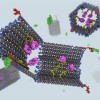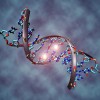Tumor Treatment: Whether to Shrink or Not to Shrink
Just like normal tissue, tumors need blood vessels to grow. Because of this, drugs that stop angiogenesis, or the formation of new blood vessels, are one important approach to treating cancers. These angiogenesis inhibitors stop tumor growth by starving them of oxygen and nutrients, usually by interfering with signals from the tumor cells that promote blood vessel formation in the surrounding tissue.
Angiog enesis inhibitors have been shown to be effective in the treatment of several cancer types, but the results aren’t always as expected. Several recent studies show how complicated this can be. For instance, FDA approval of the drug Avastin to treat metastatic breast cancer was revoked in November, 2011. Although Avastin works to stop tumor growth, and can even shrink these tumors, the effects are temporary. More importantly, Avastin does not seem to help prolong patient survival for this kind of breast cancer.
enesis inhibitors have been shown to be effective in the treatment of several cancer types, but the results aren’t always as expected. Several recent studies show how complicated this can be. For instance, FDA approval of the drug Avastin to treat metastatic breast cancer was revoked in November, 2011. Although Avastin works to stop tumor growth, and can even shrink these tumors, the effects are temporary. More importantly, Avastin does not seem to help prolong patient survival for this kind of breast cancer.
At first, it does not seem to make sense that a drug that shrinks tumors could have no effect on survival. However, a recent study might provide an explanation: breast cancer cells fight back when starved of oxygen. By growing breast cancer cells in mice, Max Wicha and his colleagues have shown that the number of cancer stem cells in tumors increases after treatment with anti-angiogenesis drugs. They could also increase the number of cancer stem cells when growing breast cancer cells in a low-oxygen environment, suggesting that the drugs were affecting stem cell populations because they induce hypoxia, or low oxygen levels . Cancer stem cells are cells that are capable of producing new cancer cells, and can also form new tumors, which may explain why tumors could shrink but end up being just as deadly.
This doesn’t necessarily mean that these drugs should never be used to treat breast cancer. For one, it may be possible to shrink the tumors and simultaneously block the formation of cancer stem cells, and this may prove to be very effective. Also, early results from studies where Avastin is used before breast cancer surgery for patients with earlier stage cancer suggest that shrinking the tumor before surgery can help eliminate these cancers and reduce the amount of normal tissue that needs to be removed. So, as seems to be the case more often than not, the biology of cancer and cancer treatment are more complicated than we might initially think, and whether to “shrink” a tumor or not will depend on the specific tumor type.
Reference: Proceedings of the National Academy of Sciences Early Edition, DOI: 10.1073/pnas.1018866109.
| Print article | This entry was posted by Bruce Nash on February 6, 2012 at 6:03 pm, and is filed under Inside Cancer. Follow any responses to this post through RSS 2.0. You can leave a response or trackback from your own site. |










